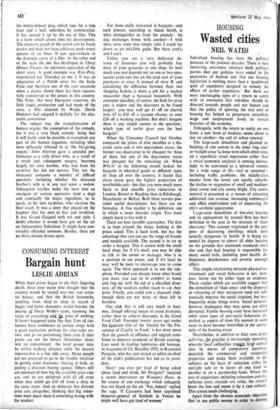Play time
TELEVISION STUART HOOD
There was a time when the Independent Tele- vision schedules used to include a quota of ninety-minute plays. Ninety minutes was natur- ally a conventional term. for once the time for commercials was deducted the true leneth
was something nearer eighty minutes. Today they have almost entirely vanished, leaving only 'hour' plays. The reason: fear in some of the major companies that a ninety-minute play may lose too many viewers for too long a period; that they may switch to sec; that they may, worst of all, switch off altogether. Yet there is evidence from the past, of which Anglia could produce some, that a good ninety-minute play can hold an audience and even get into the Top Twenty.
What the trend away from the ninety- minute play demonstrates is the old truth that some influential members of the Network Planning Committee, where these decisions of policy are reached, are timorous in their atti- tude towards their audience. prepared to stake their money—plays are admittedly expensive —only on certain winners unwilling, in spite of a lot of dynamic sales talk, to consider any- thing but tried and well-worn formulae. Unless, of course, the .ninety-minute is a package tied up by some theatrical knight and therefore saleable in the States.
The result is that the try schedule lacks an element of serious drama which would allow the writer to develop character and evolve a plot of more texture and interest than the sixty- minute play allows. The sixty-minute play on , commercial television is a linear story split into three scenes by the commercial breaks. Each scene is therefore some fourteen minutes long. The first two must end on a point of sus- pension strong enough to carry the viewer over the commercials. It is a curiously cramped convention which, at its worst, can produce a dramatic story based on a whole series of donnees, full of leaps in dramatic logic, of assertions instead of the development of plot and character. The style tends to be strong and punchy; it does not permit of nuances. The writer and the viewer are both losers.
The BBC, on the other hand, has retained the ninety-minute play, which runs for a true hour and a half, unbroken by commercials. It has opened it up by the use of film. This is a form which allows time for development. The dramatic graph of the action can be freely drawn and need not have arbitrary peaks every quarter of an hour. It can approximate to the dramatic curve of a film. At the other end of the scale the BBC has developed in Thirty, Minute Theatre the television equivalent of the short story. A good example was Roly-Poly, transmitted last Thursday on sec 2. It was an adaptation of a Polish entry for the Italia Prize and therefore one of the rare occasions when a drama shown there has been success- fully transferred to the screen in this country. The Poles, like most European countries, do little studio production and had made of the story a film directed by Wojda. Derek Hodinott had adapted it skilfully for the elec- tronic convention.
The subject was the transplantation of human organs; the assumption of the comedy, for it was a very black comedy, being that it will fairly soon be possible to transplant any part of the human organism, including what were delicately referred to as 'the life-giying organs.' John Alterton gave a splendid, per- formance as a rally driver who, as a result of a crash and subsequent surgery, becomes largely his own brother, who had been his co-driver but did not survive. , This sets the insurance company a number of difficult questions, including whether the deceased brother's wife is in any real sense a widow. Subsequent crashes make the hero into an amalgam of various spectators (and a dog) and eventually the major ingredient, so to speak, in his new co-driver, who survives the final crash. It was a story that played on the laughter that lies next to fear and revulsion. It was Grand Guignol with wit and style. I doubt whether it would have got on the air on Independent Television. It might have con- ceivably offended someone. Besides, there are no thirty-minute drama spots.







































 Previous page
Previous page